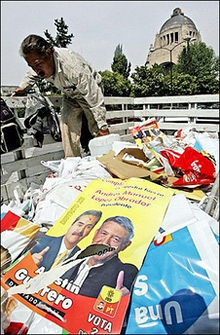 |
 |
 |
 Editorials | Opinions | July 2006 Editorials | Opinions | July 2006  
Bitter Divisions Behind Close Mexican Polls
 Financial Times Financial Times


| | A municipality worker clears the city from electoral posters the day after the Mexican general elections, in Mexico City. Conservative Felipe Calderon insisted a lead of 400,000 votes secured his victory in Mexico's presidential election, but his leftist rival dismissed the claim and questioned the count.(AFP/Yuri Cortez) |
Mexico’s elections on Sunday were supposed to be a decisive step in the country’s transition towards a mature, developed democracy, laying the ghost of past electoral fraud and a long history of manipulation of poll results.

That may still happen. But by claiming victory ahead of a formal recount of the vote and the announcement of final results – probably later this week – the rival rightwing and leftwing candidates have set the stage for a serious escalation in political tensions.

A contested result would be the worst possible conclusion to what has been a rancorous and divisive period of campaigning. It provides nascent democratic institutions with a tough test.

The Federal Electoral Institute (IFE) ruled late on Sunday night that the race between front-runners Felipe Calderón of the centre-right governing National Action Party and Andrés Manuel López Obrador of the leftwing Democratic Revolution Party (PRD) was too close to call.

Although this count could take time, the point is it is taking place according to clear laws that have guided the country’s return to democracy after 71 years of one-party rule that finally came to an end in 2000 with the election of Vicente Fox as president.

In the light of that, the candidates’ decisions to claim victory on the basis of exit polls, their own surveys or partial results was at best ill-judged. Their response could undermine the authority and credibility of the IFE that has been painstakingly established over the past three decades.

It could also weaken the mandate of whoever emerges triumphant. On Monday Mr Calderón looked to be the more likely winner, but whatever the final outcome a substantial number of Mexicans will almost certainly believe the election to have been fraudulent.

In any democracy this would be undesirable. But in a country as socially unequal and politically polarised as Mexico it could be destabilising. In several Mexican states, for example, there is a real risk that already serious labour conflicts, such as one involving a radical teachers’ trades union in the poor southern state of Oaxaca, could become more dangerous.

How ironic then, that the Institutional Revolutionary Party or PRI, the party responsible for some of Mexico’s worst abuses of democracy in the past, was on Sunday the only one of the three leading forces to insist on waiting for an official result.

The political leaders must now stand back and allow the electoral authorities to do their work. They should then press any complaints or challenges through appropriate legal channels – and respect the resulting verdicts.

After such a long and intemperate campaign it was always clear that the winner would have to build bridges with defeated opponents and seek to rebuild national unity. Sunday’s events mean that this kind of reconciliation will be all the more difficult to achieve. | 
 | |
 |



